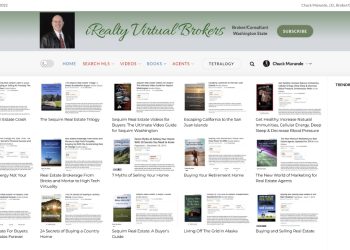“The good news is that recessions often act as catalysts for innovation.” Carmine Gallo, The Innovation Secrets of Steve Jobs
We are living in challenging times. Not long ago (2007 through 2017) we came through the worst real estate and economic recession in decades. We had high unemployment, a Federal budget that was so out of control, the U.S government lost it’s triple-A credit rating for the first time in history. The mortgage and banking industries experienced a major crisis and barely survived. Small businesses have been under attack with layers of regulations and excessive taxes, and our political landscape remains a moral disgrace.
Time magazine called this past decade the “Decade from Hell.” In his book, The Innovation of Steve Jobs, Carmine Gallo wrote:
“I would not be surprised if ten years from now we discover that the ‘Decade from Hell’ was actually the decade that inspired countless new products, services, methods, and ideas.”
These are challenging times. We are in the midst of extraordinary changes, and the real estate industry has been hit hard with the necessity for change. We who are in real estate sales must learn to adapt and grow fast, or we will die. We must learn to bridge the gap from the old to the new.
Bridging the gap from the stuck-in-the-box traditional real estate brokerage model is not a giant mental leap for early adopters who get it. Early adopters have been flexing their mental muscles for a long time, and what they want and need are the specific strategies and technical tools to make the actual leap across the chasm.
“The great digital push is under way. We live in an age when the tools of self-expression have never been more accessible.” Adam L. Penenberg in Viral Loop.
For real estate brokers who recognize that the key to their future success is understanding the tectonic shifts in consumer demand and that the catalyst of those shifts is technology, their question then becomes, “How do I bridge the gap?”
First, agents must have a deep substantive knowledge of the real estate business. Second, agents must have the sales skills to persuasively sell their services. Third, agents must effectively use technologies to connect and communicate with clients. Of course, they need a business model that will facilitate all of this. Sounds easy enough, doesn’t it? It’s not. Mastering all three and bridging the gap between these components is still a mystery to the vast majority of real estate agents trying to survive today.
Big real estate offices and franchises bring both advantages and disadvantages to the table. Large organizations can find themselves challenged by virtue of the size. Bureaucracy creates its own challenges when it comes to efficiency and adapting quickly to new changes. Turning a speed boat to avoid an iceberg is much easier than trying to turn the Titanic quickly.
In the beginning Microsoft was the great anti-IBM, and now when it comes to getting ideas from conception to approval to implementation, there are over 20 levels of management, killing new ideas before they ever see the light of day.
In its youth Google was the savior of the Internet with the slogan, “Don’t be evil,” but now it’s sheer corporate size (and greed) hinders its ability to move quickly and get things done without being evil.
Large corporate structures have a well established pattern of creating their own worlds with their own internal gravitational systems, and responding in a timely manner to consumers is simply outside their galactic space. Of course, every corporation always claims it is on the cutting edge and meeting its customers’ greatest needs. But consumers know better, and consumers’ answer is to quietly move on.
Today agents must have a deep substantive knowledge of the real estate business, the sales skills to sell their services, and must be able to use technologies to connect with their clients. Because of the economic recession of the past decade, the difficult real estate landscape, and the dramatic changes in technology and evolving business models, it has been very hard for brokers to adapt with confidence.
Today all three of these basic components must be put together in the right mix for a powerful marketing campaign that makes up a new business model. Beneath all of this at the foundational level one must not forget the consumer is now the center of the Universe, and everything about this new business model, all the marketing, all the technology, every goal and purpose, and every process is an outgrowth of this reality. Let’s examine these three in more detail.
Substantive Knowledge
Clearly agents today must have a wealth of knowledge and experience in the core subject of real estate in order to have something to offer clients in the new world of online research and due diligence. Gone are the days when agents could be dummies and pick up clients merely by answering the phone or running a silly sales ad. Listings are great lead generators, but they are no longer the easy street to big commissions. As Hugh MacLeod wrote so eloquently:
“The web has made kicking ass easier to achieve, and mediocrity harder to sustain.”
Today prospective buyers want to hire someone with years of knowledge and experience, and they want an agent who is courteous, professional and trustworthy. Buyers now can do this kind of research on the Internet in a matter of minutes. This means that a real estate agent who hopes to present himself or herself in the cloud as a credible agent must have something to offer.
I find it fascinating that buyers are the ones doing so much research on the Internet and doing their due diligence on areas, houses, and agents. Sellers generally are not. Buyers not only do extensive online research before they arrive to look at homes, but then they look at many homes in person to complete their knowledge of home values and features. Sellers neither do online research to find comparables, nor do sellers spend time viewing dozens of homes currently on the market. Instead, sellers simply call an agent and rely on the agent to tell them what their home is worth and trust that their agent has a great marketing system. Sellers do not do their due diligence on their agents either. Buyers do extensive research on their buyer’s agent.
This explains why it is that buyers are discerning when they hire an agent, but sellers are not. It also explains why clients of buyers’ agents have a high satisfaction rate, but clients of listing agents have a low satisfaction rate in this market.
Too many listing agents today don’t have anything new to discuss with their clients when nothing is happening, so they aren’t calling them every week just to say, “Hi, I don’t have anything to report.” Many listing agents simply list a lot of houses, put them in the MLS and ignore their clients, hoping that some agent will sell their listings for them. If a listing agent gets lucky, he will double dip and get a big commission for doing nothing other than listing a property and writing an offer for a buyer who hires him as a dual agent.
The lazy and incompetent agents are going to get washed out of the real estate business because of these dramatic changes in the industry, and the rest of us will be thankful for that. A slick website with a pretty photo is not going to be enough to save them. A good sales pitch will not be enough. Consumers want substance, and that means they want a real estate agent who has the knowledge and experience to help them get what they want. With the free flow of information on the Internet, this has become very important to clients. Clients are becoming much more discerning when it comes to a salesman who looks good, smells good, and says all the right things to get a listing. Clients are not so easily fooled anymore. For example, clients are figuring out that some agents are really good when it comes to a listing presentation, but beyond that, they have nothing of substance to offer. Many are without a powerful Internet marketing system and with no real substantive knowledge and experience in times like these. Clients are asking questions they never had to ask before.
The answers you get are only as good as the questions you ask. Clients are starting to get this figured out, and they’re asking a lot more questions.
So the first thing today’s real estate agent needs is a wealth of substantive knowledge. Of course, a new agent without this knowledge and experience can partner with a more experienced agent to serve clients, but the clients still wants the substance.
Because it is so important to blog (and compose for social media and write scripts for videos) today to reach clients, a broker today needs lots of knowledge and experience to have a stable of articles in their head for their blog.
Sales Skills
Having real estate knowledge and experience is not enough to compete in the new world of real estate marketing. Agents must have the sales skills to persuasively sell their services. Today this means they must be wordsmiths. This has not always been the case. For decades agents have not had to work very hard to set themselves apart from the rest of the crowd of licensees with their written classified ads.
Today, more than ever, the most important sales skills agents must have, apart from being able to verbally communicate well with clients, is drafting persuasive written sales material. When agents actually meet with clients, they must have good verbal sales skills. That’s a given. But the new business model for agents requires the vast majority of marketing to be in the clouds (on the Internet), and that involves written sales skills. This was not part of the business model for agents in decades past. This is a huge paradigm shift. Do not underestimate the importance of this change for your business.
Writing good sales scripts is absolutely critical to success, because today persuasive writing involves much more than a simple classified ad. With the growing importance of the Internet in marketing and advertising, good writing is a vital part of:
• MLS narratives (which now get syndicated to dozens and even hundreds of other online sites),
• Blog posts,
• Optimized words and phrases for the search engines,
• Narratives posted online in numerous places,
• Articles written and published on services designed for article dissemination online,
• Video scripts and descriptions,
• Online newsletters,
• Social media communications (Facebook, Google+, LinkedIn, Twitter, Digg, and others),
• Online magazines,
• Books, including paperbacks, eBooks, and audio books.
In other words, wordsmithing has increased in importance with online marketing, and is now a vital component of the new business model.
For decades agents were taught to get listings, advertise them in the local newspaper on Sundays by rotating them so each listing would get advertised once every two or three months. They would also run some ads periodically in the local real estate magazine. For decades the top producers went above and beyond by mailing letters and spreading flyers around at community events. Believe it or not, at one time that was considered high tech.
That was the mechanical approach, and it worked for a long time. It no longer works on its own. Now the top producer must set himself apart from other agents by actually coming up with effective sales scripts that are appropriately published in key places on the Internet. The challenge is that it takes skill to write good sales scripts, and for too long real estate agents have gotten by with lazy scripts. Just read the typical newspaper classifieds and notice how boring the real estate listings are. Thirty years ago we were writing the exact same dribble. But times have changed, because consumers are far more educated and have powerful resources at their finger tips.
Mastering Technology
A real estate agent must effectively use technologies to communicate with clients. While this component is new in the mix of a successful business model for real estate brokers and agents, it has transformed the importance and value of the first two components. The successful business model for the future is not just a matter of tweaking the old business model. The New World of Marketing for Real Estate Agents is a completely different planet. This is why traditional brokers and agents are having such a hard time comprehending the change necessary for survival.
We are living in interesting times. Today the successful agent must not only have a wealth of substantive knowledge in real estate plus excellent skills in putting together successful marketing campaigns with great written scripts, but he/she also must be able to deliver all of this to clients with the latest high tech software and online tools.
There must be substance, and it must be persuasive, and it must be effectively delivered to the target audience.
Real estate agents who think they can delegate the technical delivery of their messages by simply hiring a computer tech or an Internet marketing company or an SEO expert are setting themselves up for failure. There are two gaps that must be bridged to avoid this failure.
The First Gap
The first gap is between substantive knowledge and sales skills. The two are not the same, and agents who have extensive real estate knowledge do not necessarily master sales and marketing, which includes writing good sales scripts. In fact, most do not.
If an agent seeks to delegate the sales and marketing end of their business to an assistant, he/she will find out that trying to communicate years of substantive knowledge to another person writing sales scripts is full of challenges. The person writing the sales script who is not a real estate agent just doesn’t know real estate as well and doesn’t know the clients like the agent does. Unless the agent can do a Vulcan mind meld, the two minds will not become one.
The challenge is very real. Agents must get their knowledge and intuitive sense for their clients’ needs into the heads of the people writing their sales scripts, which will largely consist of well written articles in a venue called permission marketing.
I don’t want to pass too quickly over this point. Writing sales script today is not simply a matter of drafting a boring classified ad. That’s what it has been for decades. If that all it was, an assistant could learn to do that well. Writing sales script today includes, among other things, writing 500 word articles for a blog, articles that are persuasive. This is new to the real estate business, and it’s new because of the Internet. This is the tip of the iceberg on this subject, because writing good sales copy today is a whole new world. There is no way an experienced agent with years of experience that must be translated into practical tips for clients in a world called “permission marketing” can simply delegate this important responsibility to an assistant.
If agents are good enough to write their own scripts (articles), that is great and they can bridge this gap. But the reality is that the vast majority of agents are not good writers of articles. Most agents are not wordsmiths. I believe agents can become good writers if they are teachable. That’s the key. Some are not teachable. Arrogance is a terrible thing, and I think it is one of the reasons we often find ourselves stuck and not making progress. Pride or arrogance can blind us from seeing the truth about ourselves and inhibit our ability to improve.
The Second Gap
The second gap is between substantive and sales knowledge on one side of the canyon, and the technological knowledge that builds websites and blogs and creates beautiful graphics, designs good intuitive navigation, and understands search engine optimization (SEO).
The challenge may be apparent here. The question a smart real estate agent will be asking is, “How do I get my real estate knowledge and intuition for my clients’ needs into the head of my technology guy so he can reach my clients?” Many agents have learned the hard way that hiring so-called experts to build websites does not mean they write the content. They don’t have the knowledge to write the content, and consumers are not interested in boilerplate templates. Consumers know the difference.
I know a broker who hired a technology company to build a website. They paid the company $6,000, and six months later they had a website. There was no content or photos, only a layout with some standard graphics. There was no MLS search page with an IDX data feed for clients. There were no widgets for clients to use, and there were no connections to social media sites. There were no articles on local real estate issues. When the broker called his technician, he was told the technician did not write articles for them. They had to write their own articles and email their articles to the technician who would post them. The technician used his expensive website software that was only installed on his computer, so online editing was out of the question. In addition, if the broker wanted photographs on the site, they would have to submit those. How much did the technology company charge monthly, in addition to the $6,000 they already charged? Another $35 per month, unless there was editing to do for photographs and banners, and then the additional fees “would be more.”
Notice there was a huge disconnect between the technician and the broker on the content and how to connect with clients. The disconnect was so huge, nothing ever became of that site. Later that broker went out of business.
I want to share one last point that too many in the business will miss if it isn’t raised. There is so much to the art of good sales. There is an entire sales psychology of colors and graphics. In other words, in addition to well crafted facts and persuasive words, the graphics, the navigation, and the colors all play an important part in how effective a sales presentation is on a website, a blog, an online newsletter, a squeeze page, or whatever sales pitch is created on the Internet.
Statistically, you only have about five seconds to capture an online visitor’s attention, or they are gone. It had better be a premium sales presentation in five seconds to keep their attention. In other words, you better have all the components of a successful online sales ad (or article or video), or your competition will steal all the clients. Get this right the first time, because you may only have one shot with each prospective client. It’s not easy to learn how to do all of this effectively. It takes time and a good teacher or mentor to learn how to reach clients and how to have a “sticky” site to bring them back again and again.
The successful agent of the future will be so different than the successful agent of the past three decades. He/she will have to have a deep knowledge of real estate, much more so than in the past. The days of Tom, Dick, or Jane getting a license with no background in real estate, no marketing and sales training, no business degrees or business experience, no contract or legal education, and no negotiating knowledge is coming to a rapid close. Clients want and demand knowledge and expertise on entirely new levels now.
This means brand new agents will need to be mentored by an experienced agent. Wow! That sounds like going back to something that has worked for centuries—mentoring.
The successful agents of the future need to bridge the gap from knowledge to persuasive marketing, and they will also need to bridge the additional gap to delivering their message with the use of advanced technologies on the Internet. This requires developing a keen understanding of marketing, what works and what no longer works. It means understanding new marketing techniques, and how to design effective campaigns that put together a mix of solid time-tested principles that work with modern technologies to deliver the most powerful message to reach the ideal client.
Consumers have upped the ante. They want more and they want it quickly. And agents who can’t deliver will find themselves out of business. It’s already happening all over the country.
This is an excerpt from my book, The New World of Marketing for Real Estate Agents.
Last Updated on August 27, 2022 by Chuck Marunde



































